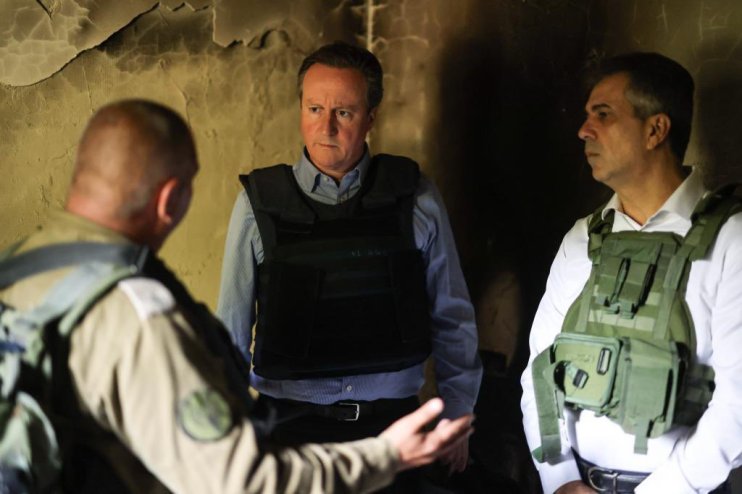Israel-Hamas war: Cameron visits Middle East before Gaza ceasefire starts Friday

A four-day ceasefire in the Israel-Hamas war will begin on Friday morning, with aid “going in as soon as possible”, Qatari officials have said.
Qatari foreign ministry spokesman Majed al-Ansari announced that there will be a pause in the fighting from 7am local time (5am GMT).
The ceasefire had been anticipated after a deal was reached, though details were still being sorted out over the last day.
Al-Ansari said the first batch of civilians held captive by Hamas will be freed at around 4pm on Friday local time (2pm GMT), including 13 women and children.
The diplomatic breakthrough promised some relief for the 2.3 million Palestinians in Gaza who have endured weeks of Israeli bombardment, as well as families in Israel fearful for the fate of their loved ones taken captive during Hamas’ October 7 attack that triggered the war.
The deal appeared to hit a last-minute snag when Israel’s national security adviser, Tzachi Hanegbi, announced a one-day delay late on Wednesday, without providing a reason. The ceasefire was originally set to begin on Thursday morning.
Al-Ansari said the two sides had exchanged lists of those to be released.
This comes after newly-minted UK foreign secretary, and former prime minister, David Cameron travelled to Israel and the Palestinian Territories this week.
David Cameron met Prime Minister Benjamin Netanyahu and President Isaac Herzog during a visit to Israel, amid the announcement of a truce in the war with Hamas.
The agreement for a four-day ceasefire in Gaza appeared to have hit a last-minute snag, with Lord Cameron telling Mr Netanyahu that he wanted all parties to the agreement to “make it happen”.
“All the hostages should be released, but I hope that everyone who is responsible and behind this agreement can make it happen, to bring relief to those families, including, of course, there are British nationals who have been taken hostage.”
Mr Netanyahu promised to “continue with the goals of the war and we will eradicate Hamas”.
“There is no hope for peace between Israel and the Palestinians and between Israel and the Arab countries if we do not eradicate this murderous movement, which threatens the future of all of us,” he told the Foreign Secretary.
Meeting Mr Herzog, the ex-prime minister said it was “very good” to be back in Israel.
“There’s a huge amount of trauma in Israel because of the taking of 244 hostages. I’m not sure anyone can fully understand and share that trauma, but I remember the worst days of being prime minister was when British hostages were taken in Syria, and so many of them lost their lives in the most gruesome, terrible fashion.
“I remember the effect that had on me as prime minister and thinking about that and so perhaps know a tiny bit of what your nation is going through.”
Lord Cameron’s visit comes a day after he met counterparts from Arab and Islamic countries – including the Palestinian Authority – at Lancaster House in London to discuss the Middle East crisis.
What’s the situation in Gaza now?
The health ministry in Hamas-ruled Gaza resumed its detailed count of Palestinian casualties from the war, saying more than 13,300 have been killed.
The new numbers were not fully broken down, but in past tallies, women and minors have consistently made up around two thirds of the dead.
The figures do not include updated numbers from hospitals in the north, where services and communication largely broke down earlier this month.
The ministry said some 6,000 people have been reported missing and are feared to be buried under rubble.
The ministry does not differentiate between civilians and militants in its death tolls. Israel says it has killed thousands of Hamas fighters, without presenting evidence for its count.
The ministry stopped publishing casualty counts as of November 11, saying it had lost the ability to do so because of the collapse of the health sector in the north.
The truce agreement had raised hopes of eventually winding down the war, which has levelled vast swathes of Gaza, fuelled a surge of violence in the occupied West Bank, and stirred fears of a wider conflict across the Middle East.
Israeli Prime Minister Benjamin Netanyahu vowed to continue the war after the truce expires, with the goal of destroying Hamas’ military capabilities, ending its 16-year rule in Gaza and returning all of the estimated 240 captives held in Gaza by Hamas and other groups.
“We will continue it until we achieve all our goals,” Netanyahu said, adding that he had delivered the same message in a phone call to US President Joe Biden.
Washington has provided extensive military and diplomatic support to Israel since the start of the war.
More than 1.7 million people, three quarters of Gaza’s population, have been displaced in the war.
Many, if not most, will be unable to return home because of the vast damage and the presence of Israeli troops in the north.
Israel has barred imports to Gaza since the start of the war, except for a trickle of aid. Humanitarian aid groups operating in Gaza said the truce will prove too short and the Rafah crossing’s capacity insufficient to meet urgent needs.
Press Association – Dominic McGrath and David Hughes
Wafaa Shurafa and Kareem Chehayeb, AP
